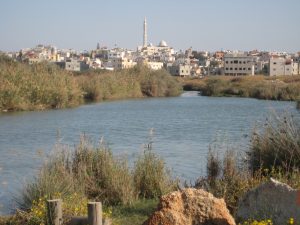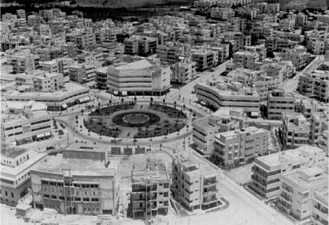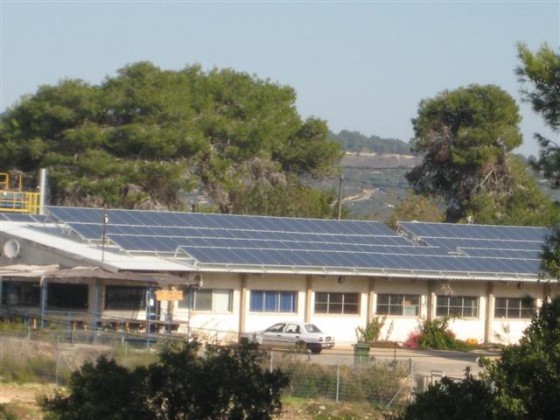 Green Prophet visits a kibbutz going green, after a destructive wildfire. They’re planting oaks and hardwood to resist the next fire.
Green Prophet visits a kibbutz going green, after a destructive wildfire. They’re planting oaks and hardwood to resist the next fire.
The 2010 Carmel Forest wildfires said to have been the worst such fires in Israel’s history, not only burnt down more than 3,036 hectares (7,500 acres) of forest and brush land and killed 44 people, it also caused moderate to severe damage to area communities.
Kibbutz Beit Oren, located 15 km south of Haifa, sits on the Carmel mountain range, and was right in the path of the fires, which caused significant damage to a number of apartment housing units on the village’s southern side, as well as to forest and garden areas belonging to the kibbutz. Their response: go green.
I visited the village on the one year anniversary of the fires, to see what this community is doing to recuperate and rebuild from the catastrophic fires that had a great physical and psychological affect on the inhabitants.
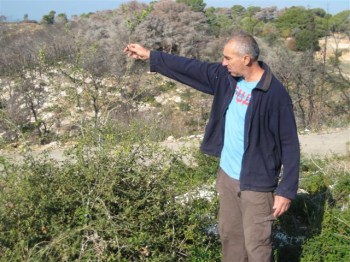 Rotenberg points out areas now starting to recuperate from the fires.
Rotenberg points out areas now starting to recuperate from the fires.
The Carmel forest itself is still in the early process of recuperating from the wildfires, including plans by the Jewish National Fund to replant thousands of seedlings in the burnt out areas. Knowledgeable forestry experts now say that the best help that can be given to the Carmel forest is simply to let it regenerate itself.
On the way up the narrow two-lane road that travels though a part of the Carmel forest that if often referred to as “little Switzerland” I noticed the irony of the fires in which part of the forests were virtually untouched, while other parts had been reduced to blackened remains of pine, oak, carob and other forest trees that were destroyed by the intense heat of the fires.
Upon arriving at the kibbutz, I met Mr. Sela Rotenberg, Beit Oren’s environmentalist and eco-tour guide. Rotenberg, who is in charge of the forests and landscaping in the kibbutz, as well as a number of environmental projects going on there, explained what happened during the December 2-6 2010 wildfires, in which a number of residents lost their homes and most of their personal possessions:
“Forty houses and apartments, plus their contents were destroyed in the fires. 34 are a total loss and 5 have been repaired. For the first month after the fires, those who had to flee their homes were put up in our hotel, which was not damaged by the fires.
“The government came and built the Caravillot prefab houses in one month, and now those who were dispossessed by the fires live in these homes.”
Rotenberg showed areas where the forests were spared by the fires, while adjacent areas were totally destroyed:
“Here there were mostly pine trees, while over there (pointing to areas still green) there were more fire resistant trees like oak. It doesn’t how the fires started. What is important now is how the forest areas are restored. I believe that what is needed is proper forest management, and to let the forests repair themselves.”
Rotenberg says the proper forest management includes thinning out thick brushy areas and planting trees like oak, olive, and carob which are more fire resistant than pine:
“Pines grow much quicker and can reach maturity in 15-20 years, while oak and carob take as long as 50 years. However, pine trees are very flammable and cannot regenerate themselves if severely damaged in a fire, while trees like oak can.”
In addition to showing areas that had already begun to regenerate, where tiny pine and other types of saplings could be seen already growing, Rotenberg pointed out some of the kibbutz’s environmental projects.
Chicken power from the sun
These include a number of recycling bins, a large organic garden that all kibbutz members are able to use to grow vegetables in, and a solar energy panel array atop one of the kibbutz’s chicken runs.
“The electricity produced by these solar panels are enough to provide some of the lighting in the kibbutz and all of the lighting for the chicken coups themselves” he said.
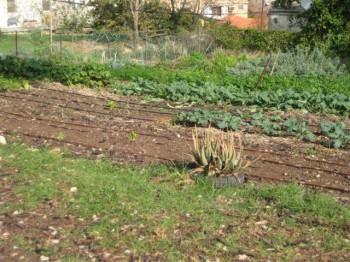 Beit Oren’s organic garden
Beit Oren’s organic garden
Rotenberg says that the environmental projects at the kibbutz have been ongoing for some time and that since the fires, the projects importance have been increased.
Beit Oren (Pine House in English) was given this name due to the large numbers of pine trees in this area when the kibbutz was founded in 1933. But due to fires, the kibbutz itself is now going to plant more oak and other hardwoods.
“These recent fires come on the heels of previous fires which cause the forest regeneration to take even longer. For this reason, we need to be involved in better forest management. Pine trees are no all bad as they shed their needles which make a natural compost for other trees like oak.
“The pines die sooner, and allow oaks and other hardwoods to take their place. We now have to be more conscious of our total environment as there is less water available and this results in area dryness and the possibility of future fires. Only with proper forest management can we help to prevent this serious a fire from occurring again,” says Rotenberg.
Read more on the Carmel fires and their aftermath:
After the Fire, Israel’s Carmel Forest Doesn’t Need Our Help
Jewish World to Rehabilitate Carmel Forest
Worst Fire in Israel’s Modern History Continues to Rage Out of Control

